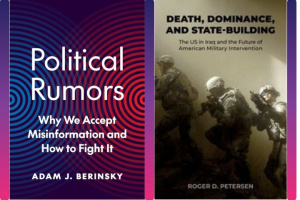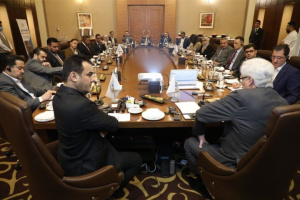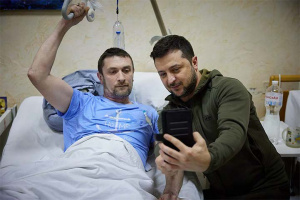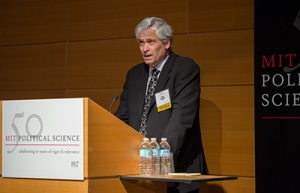
Roger Petersen
Professor of Political Science, Emeritus
Civil war; violence; war; conflict; Iraq; social science; emotions.
Biography
Roger Petersen holds BA, MA, and PhD degrees from the University of Chicago. He has taught at MIT since 2001 and is the Arthur and Ruth Sloan Professor of Political Science Emeritus. Petersen focuses on within-state conflict and violence. He has written four books: Resistance and Rebellion: Lessons from Eastern Europe (Cambridge University Press, 2001), Understanding Ethnic Violence: Fear, Hatred, Resentment in Twentieth Century Eastern Europe (Cambridge University Press, 2002), Western Intervention in the Balkans: The Strategic Use of Emotion in Conflict (Cambridge University Press, 2011), and “Death, Domination, and State-Building: The US in Iraq and the Future of American Military Intervention, (Oxford University Press, 2024).” He has taught classes on military intervention, civil war, civil-military relations, and emotions in politics, as well as classes focusing on regional conflicts in the Balkans and the Middle East.
Research
Petersen’s research focuses on violent conflict. Over his thirty years in the field, the first decade concentrated on violence in Eastern Europe, especially the Baltic region. The major product of this period was Resistance and Rebellion: Lessons from Eastern Europe (Cambridge University Press, Studies in Rationality and Social Change, 2001). The second decade saw Petersen moving into the study of violence and war in the former Yugoslavia. Petersen’s book 2002 book, Understanding Ethnic Violence: Fear, Hatred, and Resentment in Twentieth Century Eastern Europe. (Cambridge University Press, Cambridge Studies in Comparative Politics) bridged the transition from the Baltics to the Balkans. His 2011 work, Western Intervention in the Balkans: The Strategic Use of Emotion in Conflict (Cambridge University Press, Cambridge Studies in Comparative Politics), was an effort to both provide a news lens on the Balkan wars and to create a theoretical framework for analyzing the strategic use of emotions by political actors. That book won the Association for the Study of Nationalities Joseph Rothschild Prize in Nationalism and Ethnic Studies, the Association for Slavic, East European, and Eurasian Studies Marshall Shulman Book Prize, and the International Studies Association ENMISA (Ethnicity, Nationalism, and Migration Section of the International Studies Association) Distinguished Book Award.
In his third decade, Petersen turned his research focus toward the Middle East, specifically Iraq. Using fieldwork and interviews from a wide range of US military personnel and Iraqis, Petersen has recently finished a draft of a long manuscript (220,000 words) entitled Death, Dominance, and State-Building: The US in Iraq and the Future of American Military Intervention. That work is currently under review as of November 2022. The work applies Petersen’s previously developed frameworks on mobilization, identity, and emotions to explain not only the course of violence and state-building in Iraq from the time of the US invasion until the US withdrawal (2003-2011), but also the effect of the US actions on the development of the Iraqi state and further violence during the period from 2011-2021. It concludes by speculating how the 20 years of US involvement in Iraq may shape the nature of future US military interventions.
Petersen is also currently involved in several projects studying emotions in violent conflict. He has recently visited Israel, Lebanon, Cyprus, and Turkey.
Recent Publications
“Emotions as the Residue of Lived Experience” PS: Political Science & Politics 50 (4): October 2017, pp. 932-935.
Contributing article in “The Politics of Resentment: A Discussion of Katherine J. Cramer’s The Politics of Resentment: Rural Consciousness in Wisconsin and the Rise of Scott Walker,” Perspectives on Politics 2017.
“Anger and Politics,” Emotion Researcher, ISRE’s Sourcebook for Research on Emotion and Affect, Carolyn Price and Eric Walle (Eds.), August 2019.
Review of Timothy Andrews Sayle, Jeffery A. Engel, Hal Brands, and William Inboden. The Last Card: Inside George W. Bush’s Decision to Surge in Iraq. Ithaca: Cornell University Press, 2019. H-Diplo Roundtable, H-Diplo, October 2020.
“Emotions and Backlash in US Society and Politics,” The British Journal of Politics and International Relations. September 2020. doi:10.1177/1369148120948726
“The Future of American Military Intervention,” Horizons, Winter 2021 (No. 18), pp. 180-195.
“Here’s What Western Leaders Need to Remember About Zelensky’s Emotional Appeals,” Bulletin of the Atomic Scientists, March 21, 2022. https://thebulletin.org/2022/03/heres-what-western-leaders-need-to-remember-about-zelenskys-emotional-appeals/
Teaching
| 17.582 | Civil War |
| 17.506 | Ethnic Politics II |
| 17.584 | Civil-Military Relations |
| 17.THT | CIM |
| 17. 478 | Great Power Military Intervention (with Barry Posen) |
| 17.581 | Riots, Rebellions, Revolutions |
News
Biography
Roger Petersen holds BA, MA, and PhD degrees from the University of Chicago. He has taught at MIT since 2001 and is the Arthur and Ruth Sloan Professor of Political Science Emeritus. Petersen focuses on within-state conflict and violence. He has written four books: Resistance and Rebellion: Lessons from Eastern Europe (Cambridge University Press, 2001), Understanding Ethnic Violence: Fear, Hatred, Resentment in Twentieth Century Eastern Europe (Cambridge University Press, 2002), Western Intervention in the Balkans: The Strategic Use of Emotion in Conflict (Cambridge University Press, 2011), and “Death, Domination, and State-Building: The US in Iraq and the Future of American Military Intervention, (Oxford University Press, 2024).” He has taught classes on military intervention, civil war, civil-military relations, and emotions in politics, as well as classes focusing on regional conflicts in the Balkans and the Middle East.
Research
Petersen’s research focuses on violent conflict. Over his thirty years in the field, the first decade concentrated on violence in Eastern Europe, especially the Baltic region. The major product of this period was Resistance and Rebellion: Lessons from Eastern Europe (Cambridge University Press, Studies in Rationality and Social Change, 2001). The second decade saw Petersen moving into the study of violence and war in the former Yugoslavia. Petersen’s book 2002 book, Understanding Ethnic Violence: Fear, Hatred, and Resentment in Twentieth Century Eastern Europe. (Cambridge University Press, Cambridge Studies in Comparative Politics) bridged the transition from the Baltics to the Balkans. His 2011 work, Western Intervention in the Balkans: The Strategic Use of Emotion in Conflict (Cambridge University Press, Cambridge Studies in Comparative Politics), was an effort to both provide a news lens on the Balkan wars and to create a theoretical framework for analyzing the strategic use of emotions by political actors. That book won the Association for the Study of Nationalities Joseph Rothschild Prize in Nationalism and Ethnic Studies, the Association for Slavic, East European, and Eurasian Studies Marshall Shulman Book Prize, and the International Studies Association ENMISA (Ethnicity, Nationalism, and Migration Section of the International Studies Association) Distinguished Book Award.
In his third decade, Petersen turned his research focus toward the Middle East, specifically Iraq. Using fieldwork and interviews from a wide range of US military personnel and Iraqis, Petersen has recently finished a draft of a long manuscript (220,000 words) entitled Death, Dominance, and State-Building: The US in Iraq and the Future of American Military Intervention. That work is currently under review as of November 2022. The work applies Petersen’s previously developed frameworks on mobilization, identity, and emotions to explain not only the course of violence and state-building in Iraq from the time of the US invasion until the US withdrawal (2003-2011), but also the effect of the US actions on the development of the Iraqi state and further violence during the period from 2011-2021. It concludes by speculating how the 20 years of US involvement in Iraq may shape the nature of future US military interventions.
Petersen is also currently involved in several projects studying emotions in violent conflict. He has recently visited Israel, Lebanon, Cyprus, and Turkey.
Recent Publications
“Emotions as the Residue of Lived Experience” PS: Political Science & Politics 50 (4): October 2017, pp. 932-935.
Contributing article in “The Politics of Resentment: A Discussion of Katherine J. Cramer’s The Politics of Resentment: Rural Consciousness in Wisconsin and the Rise of Scott Walker,” Perspectives on Politics 2017.
“Anger and Politics,” Emotion Researcher, ISRE’s Sourcebook for Research on Emotion and Affect, Carolyn Price and Eric Walle (Eds.), August 2019.
Review of Timothy Andrews Sayle, Jeffery A. Engel, Hal Brands, and William Inboden. The Last Card: Inside George W. Bush’s Decision to Surge in Iraq. Ithaca: Cornell University Press, 2019. H-Diplo Roundtable, H-Diplo, October 2020.
“Emotions and Backlash in US Society and Politics,” The British Journal of Politics and International Relations. September 2020. doi:10.1177/1369148120948726
“The Future of American Military Intervention,” Horizons, Winter 2021 (No. 18), pp. 180-195.
“Here’s What Western Leaders Need to Remember About Zelensky’s Emotional Appeals,” Bulletin of the Atomic Scientists, March 21, 2022. https://thebulletin.org/2022/03/heres-what-western-leaders-need-to-remember-about-zelenskys-emotional-appeals/
Teaching
| 17.582 | Civil War |
| 17.506 | Ethnic Politics II |
| 17.584 | Civil-Military Relations |
| 17.THT | CIM |
| 17. 478 | Great Power Military Intervention (with Barry Posen) |
| 17.581 | Riots, Rebellions, Revolutions |





